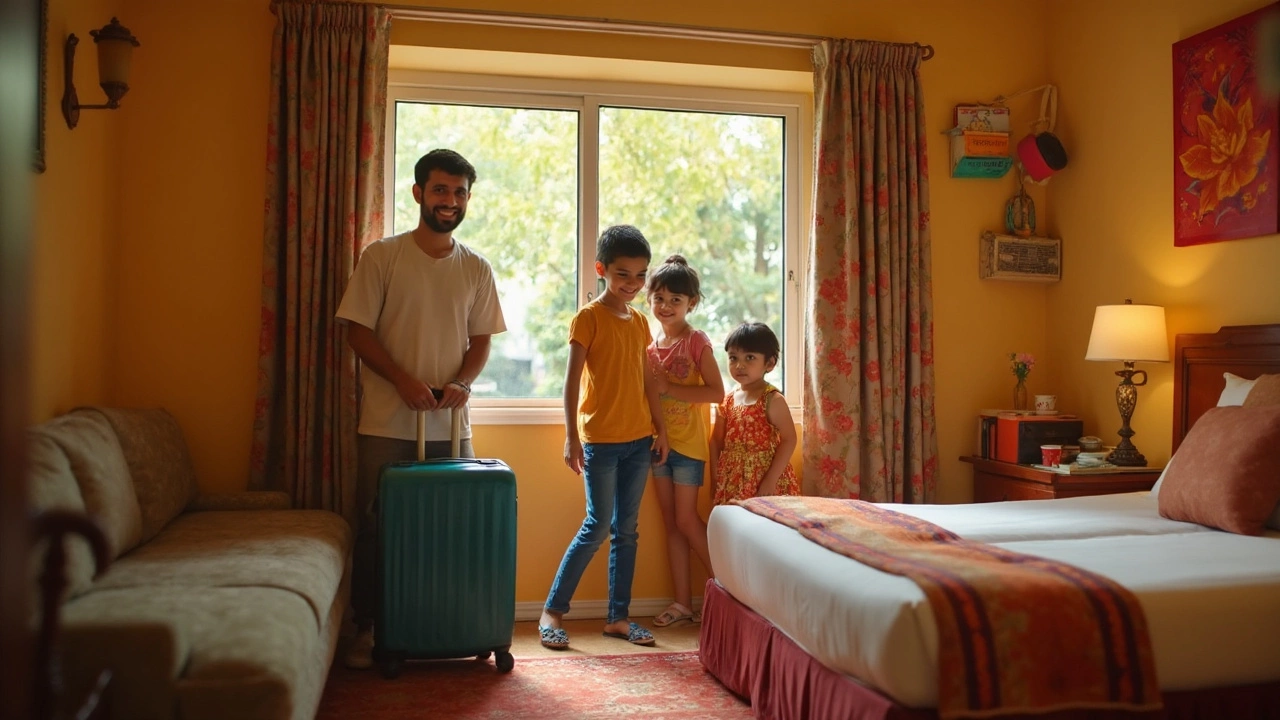You ever look up trip prices online and nearly spit out your coffee? A two-night getaway that's supposed to be ‘affordable’ suddenly costs more than your favorite concert tickets. So, what’s actually reasonable when it comes to shelling out cash for a weekend trip?
The truth: the price for a 2-night escape can swing wildly—from $150 to over $1000—depending on where you sleep, how you travel, and what you do for fun. If you're road-tripping with your own car, avoiding pricey city centers, and happy with a simple motel, you can keep it on the low end. Add a family-friendly resort, a flight, or a posh dinner downtown, and watch the number climb fast.
Here’s the thing: you don’t have to pick between blowing your budget or having zero fun. Knowing the major expense areas, plus a few smart tricks, can slash your total getaway cost—and give you way more for your money. Let’s break down the real numbers and hacks from someone who’s planned way too many last-minute escapes with a kid in tow.
- What’s the Typical Price Tag?
- Where Do the Costs Add Up?
- Ways to Save Without Sacrificing Fun
- Biggest Mistakes People Make
- Making Your Own Budget Work
What’s the Typical Price Tag?
If you want a straight answer, here it is: most people in the U.S. spend anywhere from $250 to $700 for a weekend getaway. That’s counting two nights, basic meals out, and one or two activities. But those numbers can swing up or down fast depending on your choices. Still, having a ballpark helps you figure out what’s doable without stressing your wallet.
The biggest piece of your budget pie is usually the place you sleep. A regular motel in a small town or suburb can start at about $70 a night. Mid-range hotels in bigger cities can run $150 to $250 per night, sometimes more on busy weekends. Airbnbs? They’re just as variable—sometimes a bargain, sometimes pricey, depending on demand and location.
Transportation comes next. If you drive and only spend on gas, you might pay anywhere from $40 to $100 for a few hundred miles round trip. Hop on a short flight and you could easily double or triple that number. Trains and buses fall somewhere in between, and prices spike fast if you book last-minute.
| Expense | Low Range (USD) | High Range (USD) | Notes |
|---|---|---|---|
| Lodging (2 nights) | $140 | $500 | Motel vs. hotel/city Airbnb |
| Transportation | $40 | $300 | Car gas vs. flight/train |
| Food & Drinks | $50 | $150 | Quick bites vs. sit-down meals |
| Activities/Entertainment | $20 | $100 | Parks, museums, events, etc. |
Even if you’re pinching pennies, it pays to set a loose travel budget around the $250 to $350 mark for a basic weekend. If you want a fancier hotel, a flight, or some splurges, you’re looking at $600 or more. The good news is you can tweak almost every part of this breakdown, which makes weekend getaway costs way more flexible than week-long trips.
Where Do the Costs Add Up?
It’s easy to think the big money goes to hotels or flights. But if you look closer, all those smaller parts of your weekend getaway budget add up fast. Here’s what to really watch for:
- Accommodation: Even basic hotels in most US cities run $100–$200 per night. Go for something fancier, or throw in a big city like New York or Chicago, and you’re looking at $300+ a night during busy seasons. Airbnb can swing cheaper—unless there's a cleaning fee that sneaks up at checkout.
- Transportation: A round-trip flight inside the US averages $275 per ticket in 2024, based on TravelPulse data. About 60% of weekenders drive, burning a tank or two of gas—around $80 for longer drives with today’s gas prices. Don't forget parking. City garages love charging $30–50 a night.
- Food: People think they’ll “snack and save,” but restaurant meals are a known budget buster—especially for families. Even fast-casual meals for a family of three can run $40 each sitting. A couple of decent restaurant dinners pushes your total way higher.
- Activities: You want to do more than watch TV in your room, right? Tickets to attractions (zoos, museums, theme parks) average $20–$70 each. Guided tours or event tickets add more. Pick two main activities and you could be at $150 without even buying souvenirs.
- Extras: Add tips, snacks, tolls, souvenirs for the kids, a last-minute sunscreen purchase, and other “oops” costs. These can easily hit $50–$100.
Check out this breakdown for a typical two-night trip for two adults:
| Expense | Low Range | High Range |
|---|---|---|
| Accommodation | $180 | $600 |
| Transportation | $60 | $500 |
| Food | $90 | $250 |
| Activities | $40 | $200 |
| Extras | $30 | $100 |
If you travel with kids, like my son Finnian, the numbers jump up quick. More tickets, more snacks, and sometimes larger rooms are needed. Before you book anything, tally up these categories. That’s how you avoid coming home to a bank account that looks too empty for comfort.

Ways to Save Without Sacrificing Fun
Spending less on a weekend getaway doesn’t have to mean backpacking in the rain or skipping every good meal. You just need a game plan. The biggest wallet-drains are usually hotels and eating out, followed by getting there and whatever tickets or attractions you throw into the mix.
First off, always compare accommodation options. It sounds obvious, but most people stick with hotels out of habit. But places like Airbnb or even last-minute deals on hotel apps can cut costs by half. Traveling with family? Grab a place with a kitchen. Now you’re not shelling out $60 just for breakfast each day. And honestly, cooking a pancake breakfast with my kid Finnian beats a runny hotel buffet every single time.
When it comes to getting there, flexibility saves tons. For shorter trips, drive if you have a car. Gas is usually cheaper per person than plane or train tickets, especially for families or groups. If you need to fly, check budget carriers and always look for flights on Friday night and Sunday morning or late evening—these are less popular, so you’ll finding better fares and emptier airports. According to Expedia’s 2024 data, Sunday returns tend to be about 15% cheaper.
Now, entertainment. Skip the super-priced tourist traps and check local event calendars or public activities. You’d be surprised what free festivals, hiking trails, or pop-up events you’ll find on a regular weekend. Lots of big cities offer city cards or bundled attraction passes that can cut admissions in half if you’ve got a packed itinerary. Traveling with kids? Local parks and playgrounds do the job for free.
Finally, set a loose daily budget for food and fun money, and stick to it. Splurge on one great meal or experience each day, then keep the rest simple. Nobody remembers spending $6 on a gas station sandwich; they remember the fun hike or the random street concert you stumbled into. That’s where the memories (and savings) live.
Biggest Mistakes People Make
Everyone loves a quick escape, but people often trip up on costs—sometimes by not realizing where the money actually goes. The most common mistake is underestimating how fast little expenses add up. Snacks on the road, parking, and last-minute activity fees don’t seem like much up front but can easily eat up more than $100 over a weekend.
Another big one: only looking at the nightly rate for accommodation. I can’t count how many times I thought I found a cheap room, only to get walloped by surprise fees—think resort charges, cleaning fees for Airbnbs, or steep taxes. According to a 2024 report, the average stay at budget motels racks up 18% in extra fees versus advertised rates.
Booking last-minute can backfire, too—especially on high-travel weekends or holidays. Research from Hopper shows that prices for hotels increase by 25-40% when you book less than three days out, especially during peak seasons.
People also tend to splurge on every meal because, hey, it’s a vacation. But eating out for every snack, coffee, and dinner can double the cost compared to packing simple stuff from home. One survey found that travelers, on average, spend $120 per person for food on a two-day trip if they eat every meal out.
Let’s break it down even further with some numbers:
| Expense | Planned Cost ($) | Actual Average ($) | Percent Over Plan |
|---|---|---|---|
| Accommodation | 160 | 190 | +19% |
| Dining | 100 | 120 | +20% |
| Transportation | 80 | 100 | +25% |
| Activities | 75 | 105 | +40% |
If you want your weekend getaway to feel like a treat instead of a regret, avoid these trouble spots:
- Not reading the fine print on accommodations
- Forgetting about extra transportation or parking costs
- Assuming cheap flights or rooms mean the rest will be cheap too
- Saying yes to every extra add-on or upgrade
- Not researching free or low-cost activities ahead of time
Catching these mistakes ahead can save enough cash for an extra activity—or maybe even another mini trip down the road.

Making Your Own Budget Work
Nobody wants to come home from a weekend getaway with a drained bank account and a pile of regret. The first step: get real about what you can spend. More Americans are tracking travel budgets than ever—Bankrate found that 67% set spending caps before planning a trip in 2024. Turns out, the earlier you lock in your number, the less stress you feel on the road.
Start by writing down your non-negotiables. Some folks can't skip a good meal. Others just need a comfy bed and gelato. Lay out what actually matters, and ruthlessly cut what doesn't. Here’s a simple way to break it down:
- Travel: Estimate gas or tickets early, and remember that flights always spike a month out.
- Stay: Compare not just hotels, but also vacation rentals, hostels, and quirky spots like cabins or RVs.
- Fun: Block out cash for must-do activities, but leave wiggle room for spontaneous finds.
- Food: Set a daily food budget (bring snacks!) to dodge overpriced restaurants out of desperation.
I’m not the only one who swears by simple budgeting. As travel pro Pauline Frommer says,
“Budgeting for a short trip is mostly about priorities. You can have fast internet and a fancy pool, or you can have more cash for adventure—you probably can’t have both.”
If you’re planning with others, split up the must-haves. Each person can list one ‘can’t miss’ thing. That way, nobody feels dragged along, and everyone gets some say. Apps like Splitwise let families or friends divide costs and track every expense so there’s less awkwardness on checkout day.
Another tip? Build in a buffer. Add 10-15% to your bottom line. Little extras—like parking fees, breakfast pastries, or those random souvenir magnets your kid just has to have—always show up. It’s way better to come home with leftover cash than stress about overspending mid-trip.
Bottom line: Start simple, pick what actually matters to you, and use the tools and numbers out there. Suddenly, your next weekend trip feels like a boost, not a budget buster.
